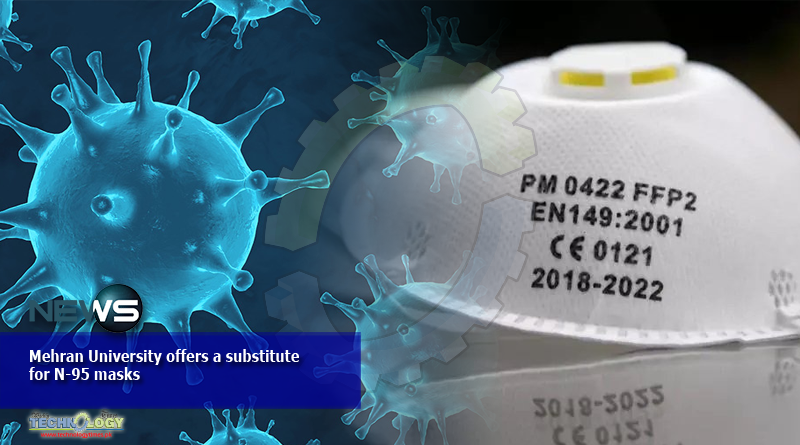Mehran University of science and technology (MUET) have made masks that can serve as an alternative to N95 masks.

As the coronavirus affected all the world, face masks have developed as the primary line of barrier. In spite of the fact that many types of face masks are available in the market, those, for example, the N-95, which is known for its significant level airborne molecule filtration ability, are short in gracefully – other than being excessively costly.
Considering this, a group of researchers at the Mehran University of Engineering and Technology (MUET), Jamshoro, set out to think of a cover that they guarantee can be a substitute to the N95 masks. The distinction lies in the material being utilized – and the costs.
“We are utilizing nanofibre layers for filtration in the face mask,” Prof Zeeshan Khatri of the Mehran University said while talking to the media person. The center of excellence for nanotechnology and materials have been doing research in nanotechnology since 2013. “It can prevent up to 95 percent of microscopic organisms or infections and forestalls potential viral transmission.”
The mask comprises of four layers – nonwoven skincare fiber, nanofibre film, nonwoven fiber, and anti-splash covering – while a regular face mask comprises of a limit of three layers of flat or creased fabric.
The nanofibres are strands with a breadth of 100 nanometres or less. They can be produced from various polymers. The N95 covers permit up to 5 percent of microbial particles to go through it and prevents 95 percent of them, attributable to which it is called N-95. A still superior mask, N99 which is once in a while accessible, prevents 99 percent of these particles.
The nanofibre size just permits particles of under 100 nanometres to go through. As indicated by Prof Khatri, the size of the coronavirus is as a rule between 150 to 200 nanometres and at times significantly bigger than that.
Interestingly, a nanofibre mask, which is additionally called a respirator, is a gadget intended to shield the wearer from breathing in hazardous substances, for example, harmful synthetic concoctions and irresistible particles. They decrease respiratory introduction to airborne contaminants.
An Oklahoma-based molecule testing hardware organization, TSI, as of late tried a nanofibre veil and found that it accomplished hindering of 0.3-micron particles, which is additionally the standard for N95 covers.
Prof Khatri has propelled a startup, NanoClo, with his partner Prof Farooq Ahmed and sold in excess of 13,000 covers, generally to health specialists, in only a month subsequent to setting up the company.
The machine used to set up the nanofibres is costly, so they improvised a machine by spending a relatively little sum. The nanofibre layer is created at the Hala Naka unit, while the sewing is done at the clothing processing plant in Hyderabad that is as of now producing masks. The present-day manufacturing limit is 1,000 masks per day, however, they play to expand it to 5,000 soon.
The startup has so far not applied for the Pakistan Council of Scientific and Industrial Research confirmation yet cover tests have been sent to the TTI lab Lahore and the SGS lab Karachi for testing.
“There is no lab for testing bacterial and viral filtration in Pakistan, in this manner, the company is sending masks to the United States and Hong Kong-based labs for the tests as well,” shared Prof Khatri, adding that they expected to get test results in around a month.
